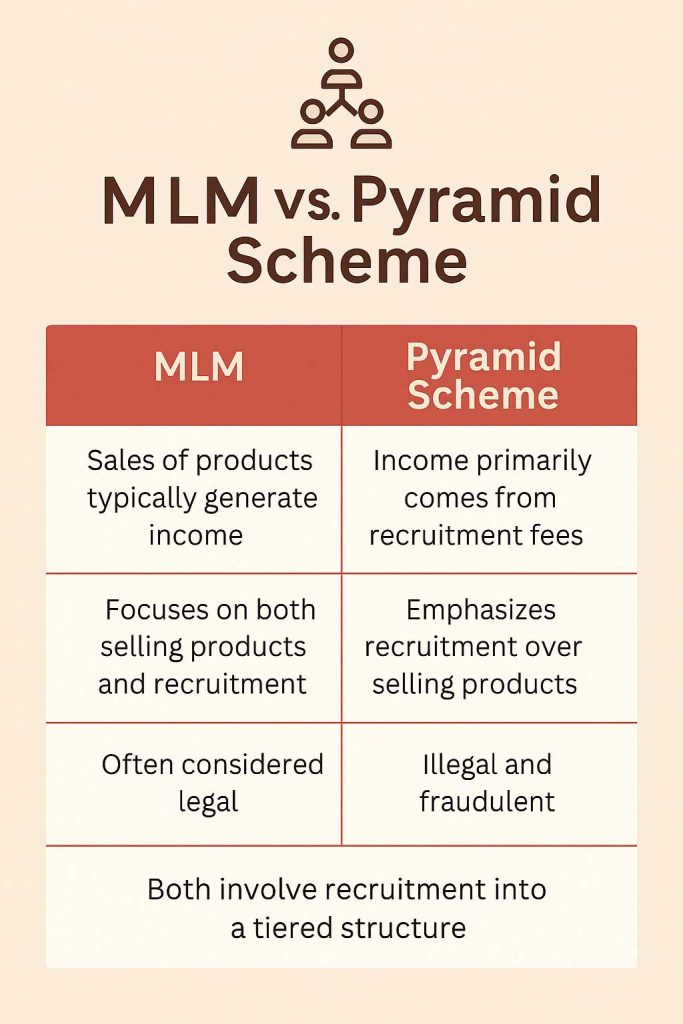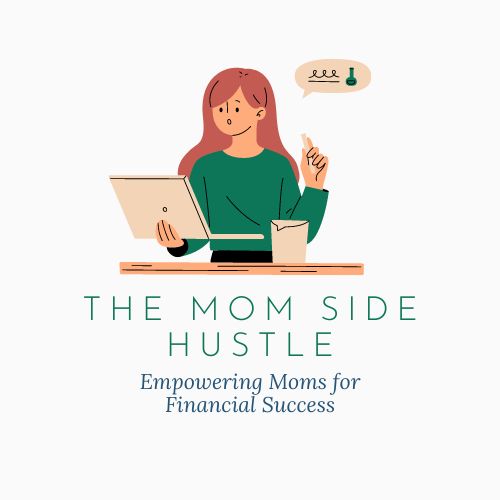You’ve probably asked yourself, what are MLMs and why do they keep showing up in your DMs. They look like side hustles—but they rarely deliver.
You’ve probably seen the messages.
“Hey girl, want to make money from home?” Spoiler alert: it’s probably an MLM.

If you’ve ever found yourself wondering what are MLMs, you’re not alone. These “business opportunities” are everywhere—especially in mom spaces. They promise financial freedom, flexible hours, and a supportive community. But more often than not, they deliver burnout, broken trust, and a drained bank account.
What Are MLMs? The Truth Behind the “Mom Boss” Hustle
In this post, we’re breaking down what MLMs really are, why they’re so common in the work-from-home world, and why they’re not the empowering side hustle they claim to be. Whether you’ve been approached before or you’re just MLM-curious, this is the truth behind the shiny sales pitches.
A Closer Look at This So-Called Side Hustle

If you’ve ever been invited to a “life-changing” Zoom call or messaged by a long-lost friend with a “business opportunity,” you’ve probably brushed up against an MLM.
These offers tend to pop up in Facebook groups, Instagram DMs, and school pickup lines—especially when you’re a mom looking for flexible work. But what are MLMs, really?
MLM stands for Multi-Level Marketing. It’s a type of direct sales model where individuals earn money by selling a product and by recruiting others to join and sell too. Every person you bring in becomes part of your “downline,” and you earn a cut of their sales. Meanwhile, you’re also part of someone else’s “upline,” sending a portion of your own sales up the chain.
At first glance, it sounds like a win-win. You sell something you (hopefully) like, build a team, and earn passive income. But in reality, most of the pressure—and profit—centers on constant recruitment. The system rewards you more for signing people up than actually selling the product.
That’s where things get tricky. Many moms are drawn in by the promise of working from home, creating community, and contributing financially without giving up time with their kids. It sounds ideal. But the truth is, most people in MLMs lose money. Between monthly purchase minimums, starter kits, conferences, and marketing materials, expenses can pile up fast.
So if you’re wondering what does MLM stand for and whether it’s a real side hustle, here’s the hard truth: you’re not running your own business. You’re promoting someone else’s brand, following their rules, and carrying all the risk. And that’s not the kind of freedom most moms are looking for.
Are MLMs Legal? (And Why That’s Not the Same as Ethical)
A question that comes up often—especially when you start digging—is this: are MLMs legal? And the short answer is yes. Multi-level marketing companies are technically legal in the United States. But legal doesn’t always mean ethical or safe.
The Federal Trade Commission (FTC) allows MLMs to operate, but with strict rules. They’re supposed to make most of their money through product sales—not recruiting new members. The problem? Many of these companies blur that line. Instead of focusing on sales, they reward aggressive recruiting, endless team-building, and big upfront purchases.

This creates a gray zone that’s easy to fall into and hard to spot at first. The FTC has fined or shut down several MLMs for deceptive practices, but many others continue to push the limits. They stay just within the rules, but their tactics still hurt the people at the bottom of the chain.
So yes, MLMs are legal. But that doesn’t mean they’re designed with your best interests in mind. It just means they’ve figured out how to play the game—and you’re the one paying to stay in it.
MLM vs. Pyramid Scheme: What’s the Difference?
By now, you might be wondering—if MLMs are legal, what makes a pyramid scheme illegal? It’s a smart question, and the answer matters.
At first glance, they look similar. Both involve recruitment, both have people at the top making the most money, and both promise big returns. But the real difference comes down to where the money is made.
Here’s a simple side-by-side to help you spot the difference:
| MLM (Multi-Level Marketing) | Pyramid Scheme (Illegal) | |
|---|---|---|
| Product Sales | Claims to sell actual products | No real product or fake value |
| How You Earn | Commissions from sales and team | Only through recruiting new people |
| Upfront Costs | Often required for kits or quotas | Usually large, mandatory buy-ins |
| Legality | Legal if focused on sales | Illegal in the U.S. |
| Sustainability | Most fail due to market saturation | Always collapses—no real value created |
| Warning Signs | Pressure to recruit, buy monthly | Fast money promises, no product |

Even though MLMs are legal, many operate dangerously close to this line.
If the focus is more on recruiting than selling, or you feel pressured to spend money every month just to stay active, those are red flags worth paying attention to.
Why MLMs Target Moms (Especially Stay-at-Home and Work-from-Home Moms)
It’s no coincidence that MLMs show up in mom groups, stroller meetups, and late-night scroll sessions. These companies know exactly who they’re talking to—and why. Moms, especially those staying home or working remotely, are a prime target. And they know how to make their pitch sound irresistible.
You’ll often hear things like, “Be your own boss,” “Work during nap time,” or “Build something for your family.” It sounds empowering. It feels supportive. But it’s carefully designed to hit emotional pressure points.

Many of us are looking for more—more flexibility, more income, or more purpose outside of motherhood. MLMs position themselves as the solution. They offer the promise of financial independence without needing to go back to a 9-to-5 job. And for moms who feel isolated, overwhelmed, or eager to contribute, it can feel like the perfect fit.
But beneath the surface, it’s not about empowerment—it’s about enrollment. These companies don’t just sell products. They sell dreams. They market freedom while encouraging you to spend your own money, recruit your friends, and stay “motivated” through a constant stream of toxic positivity.
You’ll hear that success is just a mindset. That if you’re not earning, it’s because you’re not trying hard enough. But this narrative isn’t uplifting. It’s manipulative. And it keeps moms in a cycle of guilt, self-blame, and financial stress.
Real empowerment means having choices and ownership. MLMs disguise pressure as positivity, and that’s exactly why so many moms walk away feeling used.
The Real Numbers Behind the “Opportunity”
When you’re first introduced to an MLM, it’s usually through glowing promises—financial freedom, flexible hours, and the chance to build something of your own.

For moms trying to stay home with kids or add income without a traditional job, it sounds like the perfect solution.
But once you dig into how MLMs actually work, the numbers tell a very different story.
Most People Don’t Make Money
According to the Federal Trade Commission, most people involved in multi-level marketing lose money. In fact, some estimates show that over 99% of participants never turn a profit.
While a few people at the top may earn impressive commissions, the vast majority either break even or fall into debt trying to stay “active” in the business.
The Hidden Costs Add Up Fast
These companies often require more than just a buy-in. To remain eligible for bonuses or rank advancements, you usually have to make regular purchases—sometimes hundreds of dollars a month.

On top of that, many MLMs encourage reps to attend live events and team-building retreats, all of which come with hefty travel and registration costs. You’re told this is part of investing in yourself, but in reality, you’re spending more to stay in the game than you’re making from it.
Toxic Positivity Blames You, Not the Model
Still, when people struggle, they’re rarely met with compassion. Instead, the message is often framed around mindset. If you didn’t make money, it’s because you didn’t try hard enough.
If you quit, it’s because you didn’t believe in yourself.

This kind of toxic positivity is what keeps so many women trapped in the cycle—chasing success in a system that was never built for them to win.
The Truth Behind the MLM “Opportunity”
So when someone asks what are MLMs, the answer shouldn’t just focus on the surface-level pitch. It needs to include the reality: for most moms, the so-called “opportunity” ends up costing more than it gives.
And that’s why more and more people are starting to see the MLM model for what it really is—not a side hustle, but a financial and emotional drain disguised as one.
Are MLMs Bad? Let’s Talk Impact
You may be wondering, are MLMs bad, or are they just misunderstood? On the surface, they look like positive opportunities—supportive teams, extra income, and empowering messages.

But the deeper you go, the more the true impact comes into focus. And it’s not just financial.
The Financial Toll Adds Up Quickly
Most people who join an MLM spend more than they earn. From starter kits to auto-ship orders, the costs keep coming. To stay “active,” many reps invest hundreds of dollars each month just to remain eligible for bonuses or commissions. Even if they make a few sales, they often don’t break even. For moms already juggling tight budgets, this creates even more stress.
MLMs Can Strain Relationships
Recruiting friends and family is part of the model. You’re encouraged to “share the opportunity” with the people closest to you. But over time, this can damage trust. Loved ones may feel used or pressured to support a business they didn’t ask to be part of. Invitations start to feel like sales pitches, and relationships often suffer because of it.
The Emotional Impact Is Hard to Ignore
It’s not just about money. It’s also about how these companies make you feel. You’re told success is all about mindset.

If you don’t hit your goals, the blame falls on you—not the system. This constant pressure can lead to guilt, burnout, and self-doubt.
For moms already carrying a mental load, this emotional toll can feel overwhelming.
Communities Feel It Too
When MLMs move into a community, the effects ripple out. Markets become saturated with the same products. Social feeds fill with sales pitches and curated “boss babe” success stories. It creates a culture where pretending to succeed becomes more important than actually doing well—and where real income gets replaced with image management.
So if you’ve ever asked are MLMs bad, the answer depends on what you’re measuring. On paper, they may seem harmless. But in practice, they often cause more damage than they claim to solve—especially for women who are already stretched thin.
The Side Hustle That’s Not Really a Hustle
When you first hear the pitch, it sounds like a dream. Work from home, set your own hours, and build a business around your life. But here’s the truth: MLMs aren’t true side hustles. They sell the idea of entrepreneurship, but you don’t actually own anything.
You Don’t Own the Business—You Borrow It
In an MLM, you don’t control the product, pricing, or brand. You follow the company’s rules, and you buy into their system.
The products aren’t yours. The marketing isn’t yours. Even your customer base belongs to the company, not you.

You’re not building equity or creating something lasting. Instead, you’re spending your time and money selling for someone else—without any real ownership. And if the company folds or changes its rules? Your entire “business” disappears.
Real Side Hustles Give You Control
If you want a true side hustle, look at options that give you ownership. Freelancing, content creation, and affiliate marketing let you build your brand, set your rates, and grow on your terms. Platforms like Etsy let you sell your own creations, not just someone else’s products.
When you ask what are MLMs compared to real side hustles, the difference is clear. MLMs lock you into a system where the odds are stacked against you. A real side hustle gives you freedom, flexibility, and the chance to build something that’s truly yours.
Better Alternatives for Moms Who Want Real Income

If you’ve made it this far, you might be wondering what are MLMs compared to other ways to make money from home. The good news? There are so many better options for moms who want flexibility and real income.
Choose a Side Hustle That Builds Your Future
Unlike MLMs, true side hustles give you control. You set your rates, create your products, and build your brand. Freelancing, remote jobs, or creative work let you own your time and your income.
Curious about where to start? Check out my post on The Best Legit Side Hustles for Moms—it’s packed with ideas that actually work. From freelance writing and virtual assisting to content creation and selling on Etsy, you’ll find real ways to earn money from home.
Don’t Just Chase Income—Build Something That Lasts
Your time is valuable. Don’t waste it chasing commissions in a system designed to keep you stuck. Instead, invest in a side hustle that grows with you. Whether it’s freelancing, affiliate marketing, or building a small online business, there’s a better path forward.
Let’s Be Real: What Are MLMs and Why They’re Not Worth It
If you’ve ever been approached by an MLM, you know how tempting it can feel. The promises are shiny, the community seems welcoming, and the income potential looks like the answer to your financial prayers. But here’s the truth: you deserve better than false promises and overpriced starter kits.
Real side hustles lift you up. They don’t drain your wallet or your worth. They give you ownership, flexibility, and growth that lasts beyond someone else’s compensation plan.

So, if you’ve been caught up in the MLM cycle—or are thinking about it now—I hope this post gives you a moment to pause. Your time, energy, and money are precious. Spend them on opportunities that actually serve you and your family.
Have an MLM story of your own? I’d love to hear it in the comments! Or share this post with a friend who might be considering an MLM—let’s help each other avoid the trap and build something real.
Frequently Asked Questions
MLMs, or multi-level marketing companies, sell products through a network of independent distributors who earn income by selling and recruiting others. While they may seem like side hustles, most participants earn little or no profit.
Yes, MLMs are legal if they primarily make money through product sales, not recruitment. However, many operate in a gray area and have faced legal challenges for deceptive practices.
MLM stands for Multi-Level Marketing, a sales model where participants earn commissions from both product sales and recruiting others into the business.
MLMs can create financial stress, strain relationships, and lead to guilt and burnout—especially for moms who are already balancing family responsibilities. It’s important to explore side hustles that give you true flexibility and control.
Look for red flags like high upfront costs, pressure to recruit, and promises of fast money. If success depends more on signing people up than selling products, it’s a warning sign.

Jessi, a working mom turned entrepreneur, transformed her side hustle into a full-time venture post-layoff, inspiring moms to explore new financial opportunities.


